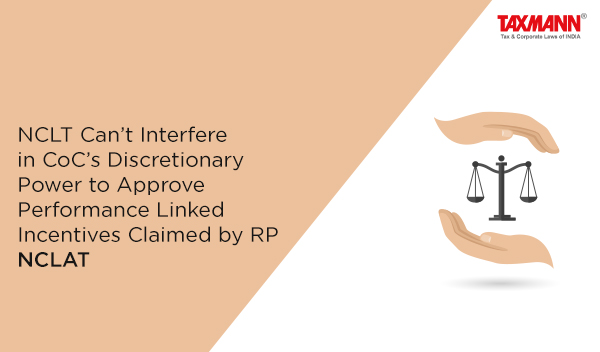NCLT Can’t Interfere in CoC’s Discretionary Power to Approve Performance Linked Incentives Claimed by RP | NCLAT
- Blog|News|Insolvency and Bankruptcy Code|
- 2 Min Read
- By Taxmann
- |
- Last Updated on 18 October, 2023

Case Details: Ravindra Kumar Goyal, RP of Yashasvi Yarns Ltd. v. Committee of Creditors of Yashasvi Yarns Ltd. - [2023] 154 taxmann.com 668 (NCLAT-New Delhi)
Judiciary and Counsel Details
-
- Justice Ashok Bhushan, Chairperson & Barun Mitra, Technical Member
-
Smaksh Goyal, Adv. for the Appellant.
Facts of the Case
In the instant case, the Adjudicating Authority (NCLT) admitted a Section 7 application against the corporate debtor and the appellant was appointed as a resolution professional (RP). On 1-12-2022, a resolution plan was approved by the CoC. The appellant claimed a performance-linked payment incentive fee (PRIF) for the value of maximization of the corporate debtor as per regulation 34B of IBBI (Insolvency Resolution Process for Corporate Persons) Regulations, 2016.
However, the CoC dismissed the resolution for payment of the PRIF fee to RP and NCLT affirmed the decision of the CoC. The appellant submitted that he was able to maximize the value of the corporate debtor and, hence, he was entitled to a performance-linked incentive fee.
Further, he submitted that the decision of the CoC refusing to accept the claim of the appellant for performance-linked incentive fee was not in accordance with regulation 34B.
It was noted that PRIF in the event it is paid to RP is part of the Insolvency Resolution Cost and the decision of the CoC approving the resolution plan also contained consideration of PRIF was a commercial decision of the CoC.
NCLAT Held
The NCLAT held that since the commercial decision of the CoC has to be given due credence and NCLT/NCLAT cannot interfere in the commercial decision CoC, the decision of the CoC in not approving the payment of PRIF could not be faulted with and was in accordance with the discretionary power vested with the CoC under regulation 34B.
List of Cases Reviewed
-
- State Bank of India v. Yashasvi Yarns Ltd. [2023] 154 taxmann.com 667 (NCLT – Ahm.) (para 18) affirmed [See Annex].
List of Cases Referred to
-
- State of Kerala v. Kandath Distilleries [2013] 6 SCC 573 (para 13)
- Committee of Creditor of Essar Steel India Ltd. v. Satish Kumar Gupta [2019] 111 taxmann.com 234 (SC) (para 15)
- Kalpraj Dharamshi v. Kotak Investment Advisors Ltd. [2021] 125 taxmann.com 194/166 SCL 583 (SC) (para 16).
Disclaimer: The content/information published on the website is only for general information of the user and shall not be construed as legal advice. While the Taxmann has exercised reasonable efforts to ensure the veracity of information/content published, Taxmann shall be under no liability in any manner whatsoever for incorrect information, if any.

Taxmann Publications has a dedicated in-house Research & Editorial Team. This team consists of a team of Chartered Accountants, Company Secretaries, and Lawyers. This team works under the guidance and supervision of editor-in-chief Mr Rakesh Bhargava.
The Research and Editorial Team is responsible for developing reliable and accurate content for the readers. The team follows the six-sigma approach to achieve the benchmark of zero error in its publications and research platforms. The team ensures that the following publication guidelines are thoroughly followed while developing the content:
- The statutory material is obtained only from the authorized and reliable sources
- All the latest developments in the judicial and legislative fields are covered
- Prepare the analytical write-ups on current, controversial, and important issues to help the readers to understand the concept and its implications
- Every content published by Taxmann is complete, accurate and lucid
- All evidence-based statements are supported with proper reference to Section, Circular No., Notification No. or citations
- The golden rules of grammar, style and consistency are thoroughly followed
- Font and size that’s easy to read and remain consistent across all imprint and digital publications are applied



 CA | CS | CMA
CA | CS | CMA
